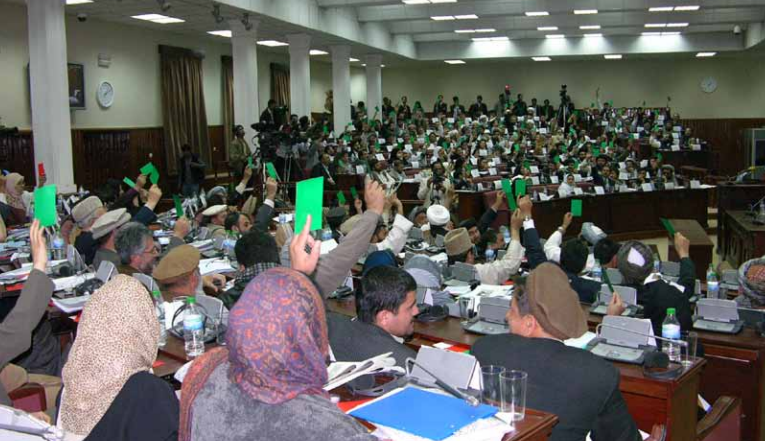Source: AFGHANISTAN RESEARCH AND EVALUATION UNIT (AREU)
Over the past ten years Afghanistan’s Constitution has been tested on several occasions, but how has it fared? As part of an AREU project to evaluate the Afghan Constitution, our latest paper examines the issue of the separation of powers under the current Constitution and finds that it suffers from flaws both on paper and in practice.
The basic premise underlying the separation of powers is that where the same entity is responsible for enacting, executing and enforcing the laws, it may lead to tyranny. Once power is separated constitutionally, the organs of government will be mutually accountable to one another, as one or more branches can act to check or balance the actions of another branch that acts in excess of its constitutionally mandated role[1].
The paper, using the case study of Parliament’s no-confidence vote practices against several ministers, discusses the ambiguities in the Constitution as well as the inherent weaknesses in the way each branch of government operates.
This publication, through extensive literature review as well as interviews with experts, illustrates how under the current Constitution the President has significant power to enact laws and control how appointments are made to all levels of the judiciary. This has undermined both the separation and balance of power under the Constitution. The paper also points out that the judiciary has struggled to establish itself as an independent branch, both because of a weak constitutional architecture as well as a historical lack of institutional capacity within the judiciary.
A number of recommendations are provided in the paper that will strengthen the separation of powers under the Constitution as a means of fortifying the nascent democracy in Afghanistan:
- The executive should strictly adhere to the limitations placed on the exercise of its constitutional powers.
- The executive should take immediate steps to nominate judges to the vacant seats of the Supreme Court and address other issues such as implementing the constitutionally mandated staggered terms, improve remuneration of judges and facilitate greater autonomy to the court in developing its budget.
- The judiciary should take steps to improve the capacity and competence of judges at all levels, and foster a culture of judicial independence.
- The Parliament should make greater use of its oversight powers by investigating government actions. It also needs to make greater efforts to improve its legislative record, particularly in terms of its ability to draft and review legislation.
“Separation of Powers under the Afghan Constitution: A Case Study” is available for download at:
The Afghanistan Research and Evaluation Unit (AREU) is an independent research organisation based in Kabul. AREU’s mission is to inform and influence policy and practice through conducting high-quality, policy-relevant research and actively disseminating the results, and to promote a culture of research and learning. To achieve its mission AREU engages with policymakers, civil society, researchers, and students to promote their use of AREU’s research and its library, to strengthen their research capacity, and to create opportunities for analysis, reflection, and debate. AREU was established in 2002 by the assistance community working in Afghanistan.
For copy requests and enquiries related to publications, contact:
Phone: +93 (0) 799 608 548
Email: publications@areu.org.af
With questions and enquiries on the report, contact Deputy Director of Communications and Advocacy Mir Ahmad Joyenda:
Phone: +93 (0)700276637
Email: joyenda@areu.org.af
Website: www.areu.org.af


